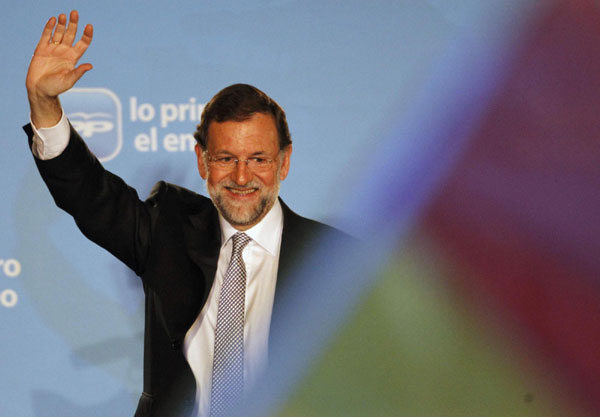Mariano Rajoy's party wins Spain election
Updated: 2011-11-21 08:12
(Xinhua)
|
|||||||||||
 |
|
Spain's centre-right People's Party (Partido Popular) leader Mariano Rajoy acknowledges supporters from a balcony of the party headquarters after claiming victory in Spain's general elections in Madrid November 20, 2011. [Photo/Agencies] |
MADRID - Mariano Rajoy has been elected as the next prime minister of Spain with a landslide victory in the general election on Sunday.
Rajoy's center-right People's Party pocketed over 10,300,000 votes to win 186 seats after nearly 98 percent of the votes were counted.
The PP polled 44.5 percent of the votes, enough to win an overall majority and govern Spain without the need to pact with any other parties.
The Socialist (PSOE) Party, who were led by Alfredo Perez Rubalcaba in the campaign, are the major losers from these elections. The PSOE polled 28.6 percent of the vote and have won just 110 seats in Congress compared with the 169 they won in March 2008, when they got 43.9 percent of the vote.
The PSOE have paid for the effects of the economic crisis which has left almost five million Spaniards out of work and the country struggling to reduce its state deficit.
Following the worst ever defeat for the PSOE since the return of democracy to Spain after 1975, Rubalcaba will now have to seriously consider his position as party leader and could make way for former Defense Secretary Carne Chacon.
In the wake of the heavy defeat for the PSOE, other parties have benefited: the United Left (Izquierda Unida) polled just under 7 percent of the vote and will have 11 deputies in the new Congress
Meanwhile Union Progreso y Democracia (UpD) also saw its share of the vote rise in comparison with 2008 and will have five representatives in Spain's Congress.
Catalan Nationalists CiU are the third strongest group in Congress after polling almost a million votes in Catalonia. CiU have 16 people while the more radical Catalan nationalist party, Ezquerra Republicana have three.
The end of violence from Basque Separatist group ETA was also a key factor in the Basque region with radical nationalist coalition Amaiur winning seven seats.
It is the first time that a party representing the Izquierda Abertzale has been able to stand at a general election since 2000 and that was reflected in an increase in the number of people voting in the region, which was the only part of Spain where the turnout was higher than in 2008.
The more conservative Basque Nationalist Party (PNV) will be disappointed to have lost ground to Amaiur, but will have five members in Congress.
Elsewhere various other minority parties, such as the Gallician Nationalists, (BNG), have two members, the same as the CC-NC-PNC (The Canary Islands Party), while three more parties, FORO, Compromis-Q and GBAI have one member each.
Spain will now be in the hands of a provisional government until December 13 when Parliament reconvenes with Rajoy as its new leader. Rajoy will be sworn in as prime minister on either December 20 or 21.
Hot Topics
HIV/AIDS, Egypt protest, Thanksgiving, climate change, global economic recovery, home prices, high-speed railways, school bus safety, Libya situation, Weekly photos
Editor's Picks

|

|

|

|

|

|







